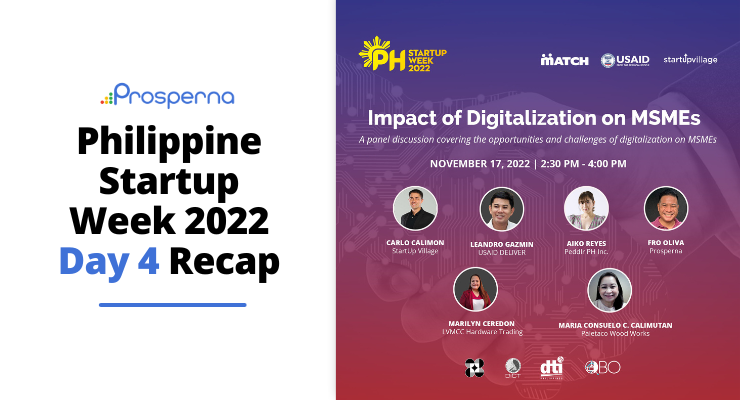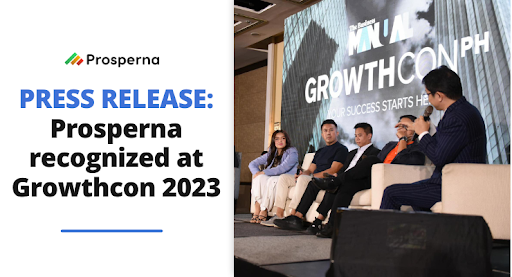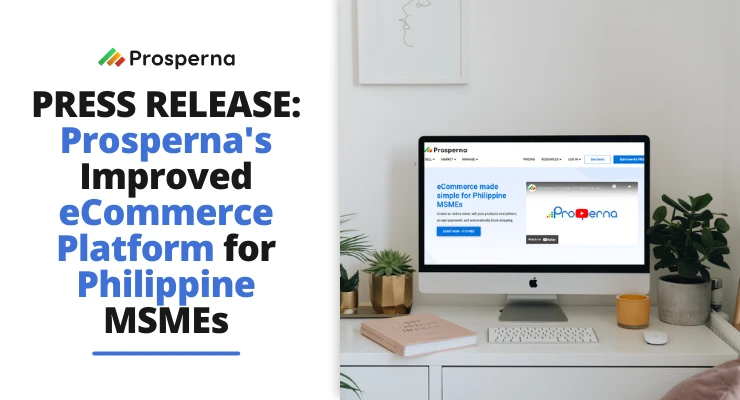November 17, 2022 — Fro Oliva, Prosperna’s Head of Partnerships, takes part in the discussion of the opportunities and challenges of digitization in the Philippine MSME sector on Day 4 of Philippine Startup Week 2022.
The panel discussion, entitled “Impact of Digitization on MSMEs”, was organized and moderated by Carlo Calimon, President and Co-Founder of StartUp Village.
It seeks to comprehend how different MSMEs in the nation are transitioning to the digital age and how startup enablers like Prosperna have made this process easier for MSMEs.
The goal of Prosperna, according to Oliva, is to empower Filipino MSMEs with simple yet powerful eCommerce software.
Since its founding in 2020, Prosperna has assisted and supported the Philippine MSME sector. By embracing digital transformation, they are helping them grow their businesses and revenues.
“One way we support the MSME sector is by providing them with this software. And ultimately, what we want to do is increase, [for] our merchants, their reach because, with our platform—with digitization—geographic limitations can be taken out. And then we want to help increase their transactions by making it easier for their customers to purchase goods from them. And then with that, we want to see them grow, in terms of revenue, in terms of size, and in terms of business life,” Oliva said.
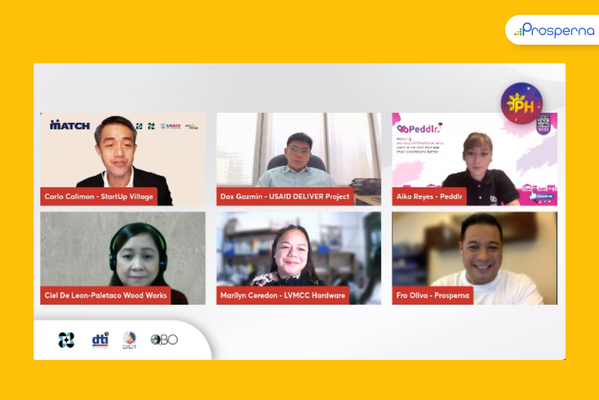
Oliva explained that they focus on MSMEs in particular due to their high prevalence and economic potential for the nation.
“The MSME sector provides about 68% of the country’s workforce—so it produces labor. It [also] produces 40% of the country’s GDP—all key numbers that [are] crucial to the growth of our economy,” he said.
Although the idea of digitalization is not new, it only became apparent, notably in the Philippines after the pandemic and the whole world was put into lockdown.
“Yung concept of digitization—I won’t say [it’s] a struggle, but a lot of people were sitting on the fence. But boom, pandemic happened, forced to digitize na sila ngayon,” Oliva said. [English translation: The concept of digitization—I won’t say [it’s] a struggle, but a lot of people were sitting on the fence. But boom, pandemic happened, and businesses were forced to digitize.]
The F&B industry was the first sector that was disabled by the lockdown, and so it was also the first industry to adapt to the digital world.
“The first movers were obviously in the F&B industry. When we first started Prosperna in 2020, 80% of our clients were [in] the F&B sector. Now, [in] 2022, medyo nag-balance out na siya. Our core pillars in terms of industry [are] F&B, Health & Wellness, Fashion & Beauty, and then Home Furnishings and Gadgets.” [English translation: The first movers were obviously in the F&B industry. When we first started Prosperna in 2020, 80% of our clients were [in] the F&B sector. Now, [in] 2022, it has balanced out. Our core pillars in terms of industry [are] F&B, Health & Wellness, Fashion & Beauty, and then Home Furnishings and Gadgets.
Oliva also proudly shared how Prosperna is leveling the playing field in the country’s MSME sector by helping those sectors that find it challenging to put their businesses online.
“Ms. Marilyn is one great example [of] a traditional business who embraced digitization and technology. Even if, technically, it didn’t fit the mold of those industries na magdi-digitize agad, she still did it. And we are very, very privileged to be able to support Ms. Marilyn and LVMCC Hardware with our platform.” [English translation: Ms. Marilyn is one great example [of] a traditional business who embraced digitization and technology. Even if, technically, it didn’t fit the mold of those industries that can easily digitize, she still did it. And we are very, very privileged to be able to support Ms. Marilyn and LVMCC Hardware with our platform.]
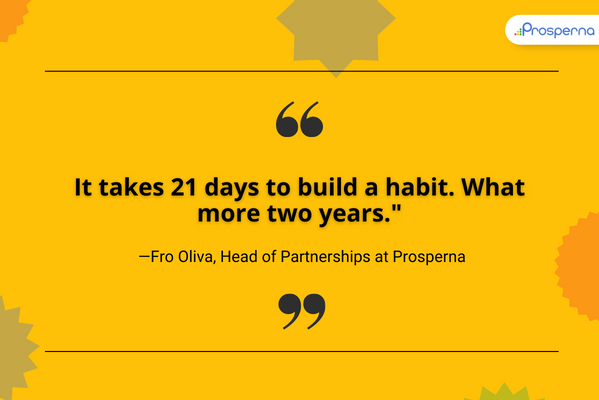
When asked why going digital is essential for MSMEs, Oliva simply likened it to developing a habit.
“Because for two years we were just at home and what we did was we were just on our phones, order lang ng order ng pagkain—GrabFood, Foodpanda. Kung may kailangan tayo for the office, bibilhin natin sa Lazada o sa Shopee. And even as the economy opens up, which is a very good thing, these habits won’t go away.” [English translation: Because for two years we were just at home and what we did was we were just on our phones and kept ordering food through GrabFood or Foodpanda. If we need supplies for the office, we buy them either on Lazada or Shopee. And even as the economy opens up, which is a very good thing, these habits won’t go away.]
He continued by stating that MSMEs are the foundation of the Philippine economy and that their digitization will aid in the recovery of our economy.
“The MSME sector is what would drive the growth of our economy. Especially now that, from a global perspective, we have inflation, yung pagtaas ng US dollar sa peso. But as long as we have a very, very strong MSME growth, this will all be leveled out, and sooner [or] later our economy will continue to rise again.” [English translation: The MSME sector is what would drive the growth of our economy. Especially now that, from a global perspective, we have inflation and the weakening of the peso versus the US dollar. But as long as we have a very, very strong MSME growth, this will all be leveled out, and sooner [or] later our economy will continue to rise again.
Other speakers who shared their insights on digitization were Leandro “Dax” Gazmin, Component Lead for SME Development at USAID Deliver; Aiko Reyes, Co-Founder, COO, CXO at Peddlr Philippines, Inc.; Marilyn Ceredon, Owner at LVMCC Hardware Trading; and Maria Consuelo Calimutan, Owner at Paletaco Wood Works.
About Prosperna
Prosperna is an all-in-one eCommerce platform for Philippine businesses. We are on a mission to empower 100,000 Philippine MSMEs with simple and affordable eCommerce software.
Want to launch your own online startup?
Create your free-forever Prosperna account now.
